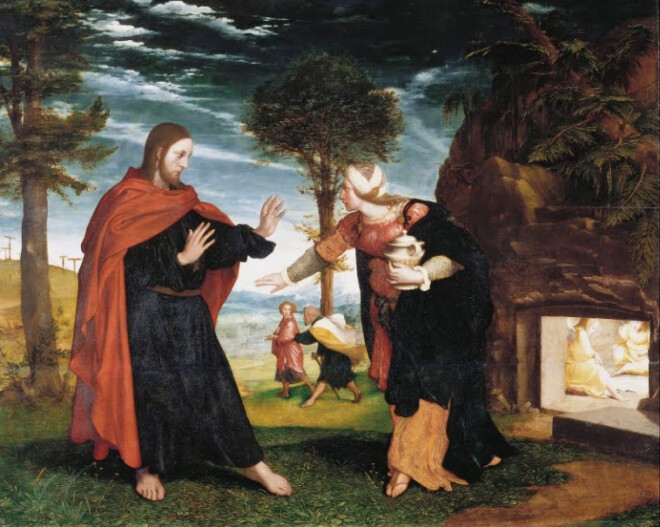Getting Ready for Sunday by The Rev. Erin Jean Warde

From George Herber's poem "Easter"
I got me flowers to straw thy way;
I got me boughs off many a tree:
But though was up by break of day,
And brought'st thy sweets along with thee.
Sunday March 27, Easter Sunday Year C—John 20:1-18
In the gospel of John’s account of the resurrection, Mary finds herself at the food of the tomb, grieving over the loss of Jesus. We can imagine that she might be coming to the tomb this early morning as a part of thechevra kadisha, or the group of faithful Jewish people who prepare bodies for burial. In Jewish belief, cleansing a body meant being made unclean, and by being made unclean one would place themselves on the margins of the power structure of their world, at least until they experienced the ritual cleansing that would restore them to wholeness once again. Regardless of social rank, we can also imagine that this uncleanliness is a mark Mary is willing to take in order to honor the life and ministry of the Jesus that she loves and that she grieves. This explains the shock of finding an empty tomb, and then telling the other disciples about his missing body. In the very first part of today’s gospel, the disciples and Mary all see that the body of Christ is no longer in its tomb, and all but Mary are said to have believed, but then returned to their home.
Mary stays, and weeps. I imagine her grief, as she realizes that the last act of honor she had prepared to give him, the act of cleansing his body for burial, has been taken from her. As she talks back and forth with the angels, and the mysterious gardener whom she cannot recognize, she continues to ask and ask again for the body of Jesus. It is possible that she is so blinded by a great desire for closure that could come through cleansing his body, that she cannot recognize Jesus standing in front of her. Finally, Jesus calls her by name, and she knows who he truly is. We see here a focus throughout the gospels: that while Jesus is focused on heavenly things, it is a struggle for Mary and for the disciples to see the truth of heavenly things. In that moment, her focus was on his dying body, but finally she sees that he stands before her resurrected. Additionally, she does not encounter the dead body of Christ that will make her unclean, and instead is made whole through his resurrected presence.
When Jesus enters the world as the resurrected Christ, he shows up first to Mary, a woman on the margins of society. Just as he did in his ministry prior to death and resurrection, he calls the least of these to be the ministers of the gospel. It is significant that in John’s account of the Easter story, it is a woman who proclaims the resurrection of Christ. The words “Alleluia, Alleluia! Christ is risen! The Lord is risen indeed! Alleluia, Alleluia!” are uttered first by Mary, and through her ministry that truth is heard throughout the regions.
The Rev. Erin Jean Warde is the Associate Rector for Christian Formation at Episcopal Church of the Transfiguration-Dallas.


